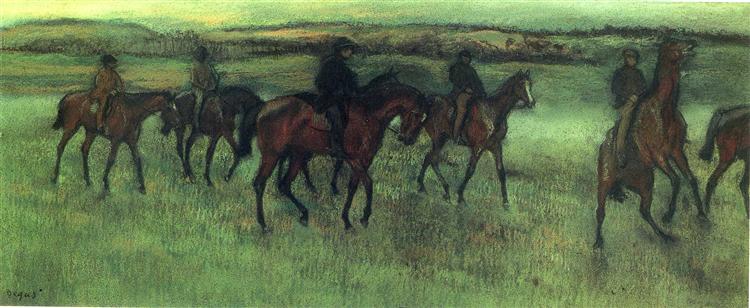Description
Edgar Degas's painting "The Horsemen", created in 1876, represents a facet of the French painter's art that, although less recognized than his famous ballet compositions and portraits, reveals his mastery in capturing the movement and vivacity of contemporary life of his time. Degas, a master of the use of color and light, employs a palette in this work that evokes a sense of dynamism and energy, which becomes a celebration of the horse as a symbol of power and elegance.
In "The Riders," we see a composition that takes place in a space that appears to be a hippodrome. The work is marked by lively movement; the riders, represented in various positions, give the impression of being in full gallop. Through the technique of asymmetry, Degas achieves an arrangement that captures the attention, suggesting that the spectator is in motion, as if he had a place on the track. This illusion of movement is a constant objective in Degas' work, which is nourished by the study of movement and the human figure, showing a particular fascination for capturing the decisive moment.
Colour plays a key role in this work, with earthy tones and shades of green creating an atmosphere reminiscent of realism and outdoor life. Shadows are subtle and light reflections are dense, guiding the viewer’s eye towards the centre of the composition, where the riders are at the climax of their race. This use of colour not only highlights the riders, but also provides a rich background suggesting the excitement of equine competition.
The characters in the work, although partially obscured by their mounts and the nature of their movement, are easily identifiable as riders in action. Degas, who often used human figures in his works, shows an interest in the physical and psychological conditions of his subjects. Each rider, in their own way, tells a story, reinforced by Degas’ choice to encapsulate a scene that resonates with the experience of an event that many in his time would have known and enjoyed. The clothing of the riders and their horses also reflects the fashions and styles of their time, providing a glimpse into the culture and richness of late 19th-century Parisian life.
Interestingly, the work can also be seen as part of the legacy of Impressionism, a movement of which Degas is considered one of the main exponents, even though he often dismissed the term. His specific focus on the plane of action and the capture of the instant resonates with other contemporary artists who explored everyday life and moments of activity.
In sum, Edgar Degas’s “The Riders” is not only a brilliant example of the artist’s mastery of color and form, but it also encapsulates the spirit of its time by documenting a vibrant scene in all its nuances. This work stands as a testament to Degas’ ability to fuse technique with cultural content, revealing a moment of movement and grace that continues to resonate more than a century later. In every stroke, in every nuance, one senses an artist’s passion for life itself, inviting the viewer to immerse themselves in the aesthetic experience of art and speed.
KUADROS ©, a famous painting on your wall.
Hand-made oil painting reproductions, with the quality of professional artists and the distinctive seal of KUADROS ©.
Painting reproduction service with satisfaction guarantee. If you are not completely satisfied with the replica of your painting, we will refund 100% of your money.

